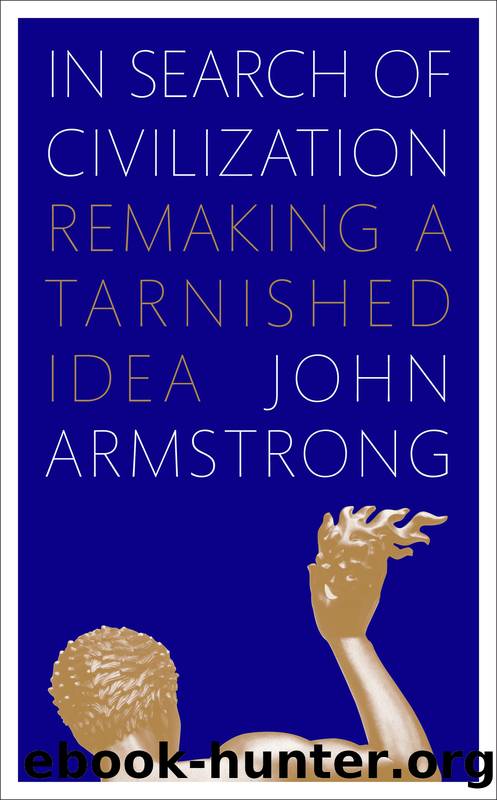In Search of Civilization by John Armstrong

Author:John Armstrong
Language: eng
Format: epub
ISBN: 9780141961262
Publisher: Penguin Books Ltd
Published: 2009-11-02T00:00:00+00:00
17
Responding to the Human Condition
Two foundational myths have had a profound influence on the way civilization has been conceived. In the seventeenth century the English philosopher Thomas Hobbes sought to describe the condition of life â as he imagined it â that prevailed in the early stages of historical human development. In this âstate of natureâ each adult person is more or less as powerful as everyone else. Although, of course, there are variations in physical strength, these are of limited significance. Even a weakling can pick up a stone and creep up on a stronger enemy in the dead of night. This is the war of all against all, a situation in which there is no possibility of undertaking any long-term venture: for whatever an individual produces will be stolen by another. Life is ânasty, brutish and shortâ.
The way out of this predicament is through subordination: everyone bows down before a single lord â freedom is renounced for the sake of security. Civilization is seen as a rigorous artifice, designed to save us from ourselves. Life is regarded as a mess that needs to be cleaned up. We need to subordinate our wayward desires to law or rationality or justice: ideals that carry a prohibition, that deny our wishes.
The other myth describes the state of nature in the opposite terms: at first all was well; each person lived in friendship and harmony with others, the bounty of nature easily met the simple and wholesome wants of all people. Life was sweet and satisfying. But by some misfortune a few people took precedence over others, sought to accumulate greater provisions, and forced the rest into servitude. The way out from this is to return to nature: simple wants and non-possessive attitudes. Civilization destroys and denatures life.
These stories set themselves up in opposition. But what if each is telling us something important? This was what Sigmund Freud thought. The significance of these stories, he held, has nothing to do with historical fact; it lies in the way they present contrasting states of mind, which are then projected backwards and restated as claims about the external world. And, Freud asserted, far from being exclusive claims, each expresses a normal and important state of mind. He saw them both as powerful fantasies that normally coexist in a single personâs inner, perhaps unconscious, life.
The first fantasy is of violent conflict, leading to violent subordination, control and domination, where one person enslaves the world. The second fantasy is of concord and universal love, in which everyone is friends with and helps everyone else. In Civilization and Its Discontents (1930) Freud argued that normal human relationships exhibited both of these characteristics: in the core, representative relationship we seek both control and free love.
Thus there occurs a type of experience that is of central importance for civilization: the recognition of the tension between these two primary longings. We know ourselves as capable of and as seeking violent dominion over the people we love, which is also to destroy them and therefore lose their love.
Download
This site does not store any files on its server. We only index and link to content provided by other sites. Please contact the content providers to delete copyright contents if any and email us, we'll remove relevant links or contents immediately.
The remains of the day by Kazuo Ishiguro(8961)
Tools of Titans by Timothy Ferriss(8357)
Giovanni's Room by James Baldwin(7313)
The Black Swan by Nassim Nicholas Taleb(7095)
Inner Engineering: A Yogi's Guide to Joy by Sadhguru(6780)
The Way of Zen by Alan W. Watts(6589)
Asking the Right Questions: A Guide to Critical Thinking by M. Neil Browne & Stuart M. Keeley(5747)
The Power of Now: A Guide to Spiritual Enlightenment by Eckhart Tolle(5740)
The Six Wives Of Henry VIII (WOMEN IN HISTORY) by Fraser Antonia(5492)
Astrophysics for People in a Hurry by Neil DeGrasse Tyson(5172)
Housekeeping by Marilynne Robinson(4429)
12 Rules for Life by Jordan B. Peterson(4298)
Double Down (Diary of a Wimpy Kid Book 11) by Jeff Kinney(4257)
The Ethical Slut by Janet W. Hardy(4235)
Skin in the Game by Nassim Nicholas Taleb(4229)
Ikigai by Héctor García & Francesc Miralles(4228)
The Art of Happiness by The Dalai Lama(4118)
Skin in the Game: Hidden Asymmetries in Daily Life by Nassim Nicholas Taleb(3983)
Walking by Henry David Thoreau(3946)
